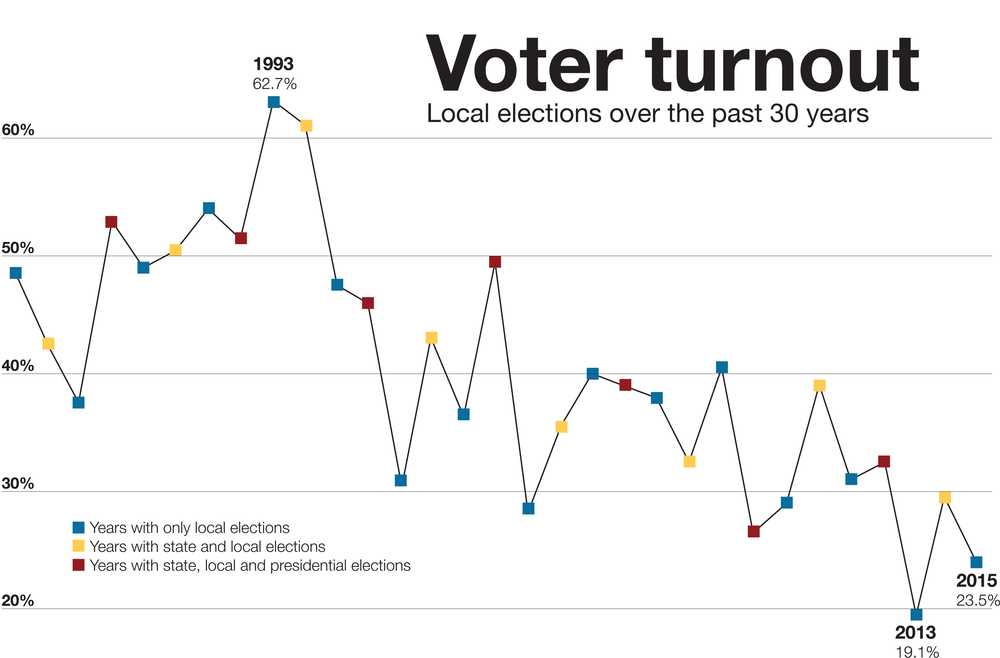Editor’s note: This is the second in a two-part series exploring Juneau’s low voter turnout. Part one published Sunday, Oct. 11, and can be found by clicking on this story at juneauempire.com.
The way Robert Barr sees it, fixing Juneau’s downward spiral of voter participation over the last three decades is “largely a matter of education.”
“It’s a matter of telling them why their votes matter and what affect they have on the community,” said Barr, a founding member of Juneau Votes.
For the last two years Barr and his group have worked toward that goal. In response to the embarrassingly low 19 percent turnout during the 2013 municipal election, Barr, who works as library director for the city, helped found Juneau Votes, a nonpartisan and nonprofit group with the mission to eradicate apathy and push people to the polls.
The group launched an information campaign, held voter registration drives and helped sponsored candidate forums with local media leading up to the 2014 election. Though it’s impossible to say exactly how much of the resulting 10 percent increase in voter turnout Juneau Votes is responsible for — it was, after all, a state election year with ballot measures — the group’s effort certainly didn’t do anything to hurt the cause.
This year, however, Juneau Votes didn’t play as active a role as it did the year before, Barr said. This was largely because the election season happened to coincide with the opening of the new Mendenhall Valley Public Library, which occupied the time of Barr and his colleagues. Juneau Votes again worked with KTOO and the Juneau Empire to hold candidate debates, and next year he said Juneau Votes will be more active.
“Juneau Votes hopes to be part of the solution, but it obviously can’t do everything,” Barr said.
The 2015 municipal election saw a 23.5 percent turnout, which is better than the 2013 numbers but still ranked as the second-lowest turnout in at least 30 years. Election records from before 1985 are hand written and most are illegible.
To help Juneau Votes shoulder the load, he suggested that the city “look again at all the ways people can vote.” He suggested looking into online voting or a vote-by-mail system, in which the city would mail ballots to registered voter who would then vote and mail them back; polling places would not necessarily be needed. City and Borough of Juneau Assemblyman Jesse Kiehl made similar suggestions.
Kiehl said that the Assembly should begin considering a couple of possible solutions: adding more ballot measures and implementing a vote-by-mail system. He didn’t seem overly confident in the efficacy of either of these potential fixes, but he said they might be a good place to start.
“This suggests, to me, that we should think throughout the year about questions to put on the ballot,” he said of possibly expanding ballot measures to draw people to the polls. “You don’t want to pick a fight with the ballot, but these questions can be helpful and increase turnout.”
The Assembly has already considered implementing a vote-by-mail system. It looked into this system in response to 2013’s wretched turnout, Kiehl said. It didn’t ultimately go anywhere, however, and the Assembly feared that it would be too expensive.
“It wouldn’t be easy, and it wouldn’t be cheap, but I think it’s worth looking into again,” Kiehl said. “If it really increases voter turnout, then it’s probably money well spent.”
There is some evidence to support such a system. In 1998, Oregon became the first state in the nation to switch to a vote-by-mail system. It has since recorded some of the highest voter turnout numbers in the nation. The Bulletin — a newspaper in Bend, Oregon — reported that the state had a voter turnout of 69.5 percent in the 2014 midterm election, which was “highest in the U.S. for the second-straight midterm election.”
And as it turns out, Juneau has an Oregon connection, who Kiehl believes might be able to advise the city if it chose to go the vote-by-mail route. John Lindback served as chief of staff for former Alaska Lt. Gov. Fran Ulmer. He then went on to help Oregon implement its online voting system, Kiehl said.
“Our Charter, much like the Constitution, is built around the assumption that people will show up and vote in a competitive process,” Kiehl said. “As that starts to decline, we need to look hard at how to turn it around.”
• Contact Sam DeGrave at sam.degrave@juneauempire.com or at (907) 523-2279.

